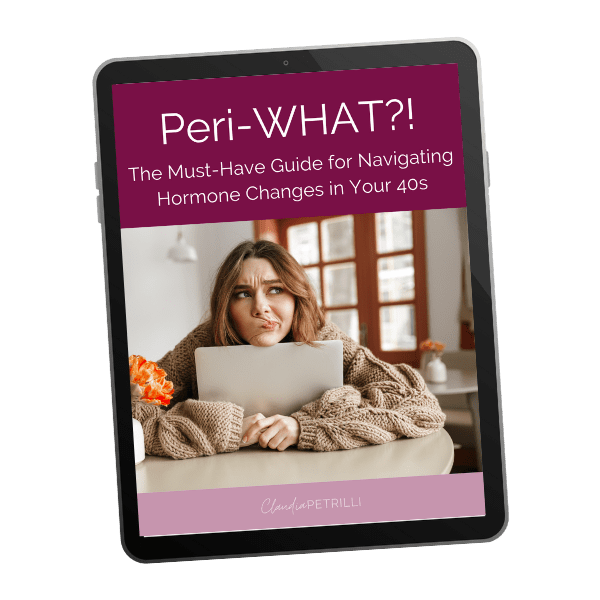
67. Understanding Cortisol After 40: Why You Need It, Why It Becomes Imbalanced & What To Do About It
Don’t Miss An Episode!
In this episode of Perimenopause Simplified, we’re diving deep into cortisol, the stress hormone that plays a significant role in our health, especially for women over 40.
If you’ve been feeling exhausted, anxious, or wired at night, it’s time to understand what might be going on with your cortisol levels.
Cortisol can become dysregulated during perimenopause, making stress management even more crucial, as your body’s hormonal landscape shifts. Tune in to learn how to support your cortisol, manage stress, and feel your best during this transitional phase of life.
What’s covered in this episode:
- What cortisol is and why it’s essential for your survival
- How chronic stress and hormone fluctuations in perimenopause can disrupt cortisol
- Why cortisol testing may not give you the full picture and the symptoms to recognize
- The impact of poor sleep, blood sugar imbalance, and stress on your cortisol levels
- Simple, actionable tips to support your nervous system and optimize circadian rhythm
- Why trauma and feeling unsafe in your body can cause cortisol issues and how to heal
Why We’re Talking About Cortisol Today
You probably know cortisol as your stress hormone, and like estrogen, it gets a bad rap. So today I’m going to clear up some of the confusion and cover why this hormone is so important, but also why it can be a problem – when it’s out of balance, especially in perimenopause.
Before I get started, this episode cannot be anymore timely, as I just finished cleaning up diarrhea and vomit on our living room area rug brought to you by Dawson, my dog. He’s lucky he’s so damn cute, because he is a handful.
Cleaning up all his bodily fluids and having to throw out yet another rug is not how I planned to start my Monday. But here we are and ‘tis life, right? Shit happens – literally. We really can learn to control how we react to stressors in our lives.
What is Cortisol, Really?
Alright, so let’s start with the basics: what exactly is cortisol? Cortisol is a hormone produced by your adrenal glands, and it’s often referred to as the “stress hormone.” It plays a major role in how we respond to stress.
But it’s also involved in regulating our metabolism, immune system, helps manage your body’s inflammatory response, supports blood sugar regulation, and plays a role in maintaining healthy blood pressure levels.
Cortisol also helps your body adapt to physical and emotional stress by increasing glucose availability, which provides the energy you need to cope with stressful situations.
An example of this is, let’s say your child runs into the street—no matter how tired you are, you suddenly have the energy to run as fast as you can to save your kid. That burst of energy is cortisol and adrenaline working together, giving you the strength and focus you need in that high-stress moment. Essentially, that’s cortisol helping you become super mom, even when you think you don’t have the energy to do it.
Additionally, cortisol supports your body’s ability to respond to injury or infection by modulating immune function. In a nutshell, cortisol helps you manage energy, inflammation, and keeps your body functioning efficiently through times of stress.
The Good and Bad Sides of Cortisol
So even though cortisol gets a bad rap, it’s essential for survival. When you’re under stress, it prepares your body for a fight-or-flight response, increasing your heart rate, raising your blood sugar, and improving alertness. These responses are crucial in a life-threatening situation.
The challenge, though, is that while cortisol is designed to help in short bursts, modern life often keeps us in a constant state of stress. And that’s where things can get tricky.
Like any hormone, cortisol is beneficial in balanced amounts. Too much, or too little, can cause serious health problems.
When cortisol is too high for extended periods, it can lead to anxiety, weight gain (especially around the belly), sleep disturbances, and an overall suppressed immune system. If you get sick a lot, you likely have cortisol dysregulation.
On the flip side, if cortisol is too low, you may feel sluggish, tired, and unmotivated. This can also cause issues with blood pressure regulation, immune function, and can contribute to chronic fatigue.
What Causes Cortisol Dysregulation?
So, what causes cortisol to become dysregulated? There are several factors, but the most common ones are: chronic stress, poor sleep, blood sugar dysregulation, and hormonal fluctuations, especially during perimenopause. All of these things can cause your body to release cortisol at the wrong times or in the wrong amounts.
Another major factor is a nervous system that’s stuck in “fight or flight” mode. If your body is constantly feeling unsafe or stressed, cortisol stays elevated. Please go back and listen to my last two episodes where I dug into the nervous system. I’ll link to them in the show notes.
Is Cortisol Testing Worth It?
Moving along, let’s talk about testing cortisol because this is where a lot of confusion happens. Cortisol is often tested via blood work, but there’s a problem with this: cortisol can spike in response to stress, like the stress of just getting a blood draw or the traffic you hit on the way there or an argument you had with your teenager before you get tested. That means you might see artificially high levels that don’t reflect your baseline.
Saliva testing is another popular option, but it’s not perfect either. While saliva can show cortisol levels at specific times of the day, it doesn’t necessarily reflect how well your body is handling stress long-term. And if you have any minor cuts or sores in your mouth which is common, that can impact your results.
The most accurate method is a 24-hour urine test, but it can be expensive, and let’s be real—most people don’t want to deal with it and quite frankly, your money is better spent elsewhere. I think testing for cortisol can be a bit pointless, especially when we have a pretty clear picture of when someone’s cortisol is out of whack.
If you’re feeling sluggish in the morning, even after sleep, or if you’re tired but wired at night, that’s a pretty sure sign your cortisol may not be regulated.
Other symptoms that you may experience are: racing mind, constant worry, anxiety, being emotionally reactive, and not being able to relax—ya know, basically every woman who comes to work with me and my team – these are all indicators that your cortisol may be dysregulated, and we do not need a test to tell us that.
Why Nervous System Support Matters
This is why we focus so much on nervous system support and circadian rhythm optimization, with clients. I spoke about that in those two previous episodes I mentioned.
If your nervous system is stuck in a constant “fight-or-flight” mode, your body will continue releasing cortisol at the wrong times.
Listen, I know that it’s hard to break some of our habits, especially when so many of us are on our phones, computers, or binging Netflix at night.
Technology has its perks, but it can really mess with our hormones, especially when we’re exposed to bright screens right before bed. If you do use your phone or laptop at night, try switching them to night mode or using a red background (on iPhones, it’s called Night Shift).
If you’re watching TV, try dimming the screen so it’s not so bright and consider wear blue light-blocking glasses. I’ll link to a couple brands in the show notes.
These small changes can really support your body’s natural rhythms and help reduce cortisol dysregulation.
Cortisol and Perimenopause
So why is cortisol a big deal in perimenopause? Well, like you’ve heard say before, as progesterone declines and estrogen fluctuates, cortisol becomes more likely to spike or get out of balance.
These hormonal shifts affect how your body responds to stress, and impacts your sleep. Add in blood sugar dysregulation—a common issue in perimenopause—and you’ve got a perfect storm for cortisol issues. This is why how and what you eat in this phase of life is so important. A lot of women complain that they have to eat protein and learn about macros, but if you want to feel better, I highly suggest you put your big girl panties on, get your protein + fiber in at all meals because you will start to feel better.
And if you need help with any of this, we are here to support you – my team and I are experts at what we do. In The Perimenopause Method, we use Hair Tissue Mineral Analysis (HTMA) to look at mineral imbalances, which can directly impact your stress response. We also focus on blood sugar regulation, inflammation markers through proper blood work and more factors that impact your nervous system. We also educate and guide you on hormone replacement therapy (HRT), which can play a big role in supporting cortisol levels.
What About Supplements?
Now you’ve likely seen cortisol-lowering supplements or adaptogens like ashwagandha or holy basil. Maybe a provider recommended them to you. While these may help in the short term and we have used them with some clients, they don’t address the causes of cortisol dysregulation. It’s kinda like putting a band-aid on and just masking the symptoms.
To truly manage cortisol, we need to focus on why it’s dysregulated: stress in your life, lack of boundaries, resentment, unprocessed trauma, not trusting yourself, not believing that you can heal, being overly critical toward yourself, hormone shifts in midlife, nutrient imbalances, and lifestyle habits.
When to See a Specialist
Finally, if you’re experiencing extreme fatigue, unexplained drastic weight changes, or other severe symptoms, it might be worth seeing an endocrinologist. They can rule out conditions like Addison’s or Cushing’s disease, which are cortisol disorders that need to be treated.
Final Thoughts
So, there you have it—everything you need to know about cortisol, why it gets dysregulated, and how to support it naturally, especially during perimenopause.
If you suspect you’re dealing with cortisol issues, remember that testing can sometimes give you a false sense of security – your symptoms tell the real story.
And if you’re ready to take control of your health, consider joining us in The Perimenopause Method, where we dig deeper into hormone balance, nervous system support, and practical lifestyle changes that help women feel their best.
Thanks for tuning in! If you found this helpful, share it with a friend or on Instagram and tag me @healthcoachclaudia. I love to see you finding value in the show. Until next time!
🧐Got questions about perimenopause? You’re in luck! I’m hosting a (free) Live Q&A: Ask Me Anything About Perimenopause!
🗓️ Save the date: June 18th at 3 pm EST / 12 pm PST and CLICK HERE to save your spot.
Can’t attend live? No problem? Submit your questions ahead of time and we’ll send out a replay.
Links Mentioned:
Episode 65: The Missing Piece Behind Anxiety, Fatigue & Weight Gain: Your Nervous System
Episode 66: Feeling Burnt Out in Your 40s? Here’s What Your Body Actually Needs
Blue Light Blocking Glasses
Claudia Petrilli is a Functional Health Coach, Integrative Nutrition Coach, Women’s Health Educator, and creator of The Perimenopause Method. Having experienced debilitating periods, digestive issues, a sluggish thyroid, a pituitary tumor, and perimenopause symptoms in her late 30s, she knows exactly what it’s like to get dismissed by doctors and spend years searching for answers.
Connect with Claudia:
FREE GIFT: Peri-What?! The Must-Have Guide for Women 40+ Navigating Hormone Changes
FREE GIFT: Perimenopause Daily Checklist
WORK WITH US: The Perimenopause Method
BOOK A CLARITY SESSION: Perimenopause Clarity Session
HRT COURSE: Perimenopause HRT Roadmap
QUESTIONS? EMAIL: claudia@claudiapetrilli.com






